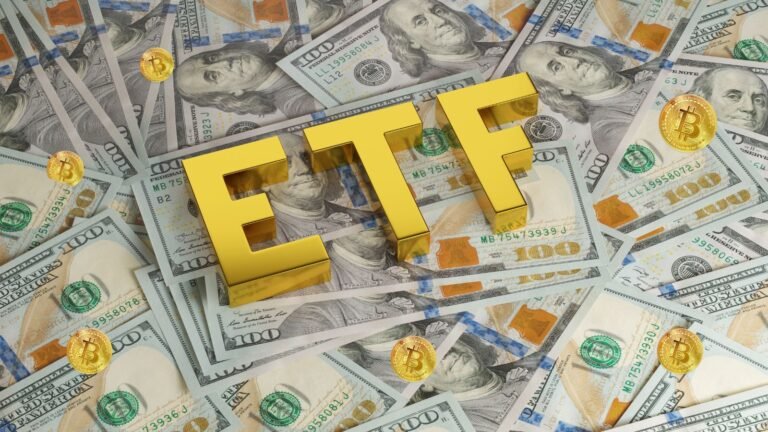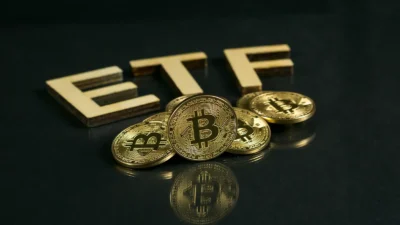Table of Contents
ToggleAs an investor, you always seek new and innovative ways to diversify your portfolio. Exchange-traded funds, or ETFs, have become popular investment tools for gaining exposure to different markets and sectors. Now, the digital assets and blockchain technology world has opened up a new frontier for ETFs with the launch of cryptocurrency ETFs.
For those interested in investing in cryptocurrencies like Bitcoin and Ethereum but want the convenience and liquidity of an ETF, cryptocurrency ETFs offer an attractive opportunity. Explore cryptocurrency ETFs, how they work, the options currently available to investors, and what the future may hold for this new category of ETF.
What Is an ETF in Crypto?
An ETF, or exchange-traded fund, is a type of fund that tracks an index, sector, commodity, or other asset. ETFs are traded on stock exchanges, similar to stocks.
Crypto ETFs hold cryptocurrencies and aim to mimic the price of the underlying digital assets. They provide exposure to the cryptocurrency market without you having to buy the actual coins or tokens.
Some key points about cryptocurrency ETFs:
- They are more accessible to mainstream investors as they can be bought and sold on public exchanges during trading hours, unlike actual cryptocurrencies, which typically require setting up a digital wallet.
- They allow investors to gain broad market exposure without the complexity or risk of buying the currencies themselves.
- Crypto ETFs charge management fees but typically have lower prices than other managed fund options.
- They enable speculative interest in cryptocurrencies, which could increase the market and prices. However, this also increases volatility.
Cryptocurrency ETFs provide a simple way to gain exposure to this alternative asset class. They allow investors to participate in the emerging digital currency space with the benefits of a traditional fund structure.
Types of ETFs
There are two main types of ETFs in the cryptocurrency market:
Index-Based ETFs
These ETFs track a basket of digital assets to match the performance of a benchmark index. They provide broad market exposure and diversification. Examples are funds that track the total cryptocurrency market or large-cap coins.
Thematic ETFs
These ETFs focus on a specific segment of the digital asset market, such as blockchain technologies, decentralized finance (DeFi), gaming, or metaverse projects. They allow investors to gain targeted exposure to trending areas. However, thematic ETFs tend to be riskier as they concentrate investments in a narrow market subset.
So, index-based ETFs offer a simple way to gain broad exposure to the cryptocurrency market, while thematic ETFs allow investors to place targeted bets on high-growth segments. When building a portfolio, a mix of index and thematic ETFs may achieve an optimal balance of diversification and growth.
Components of Crypto ETFs
The components of a crypto ETF typically include:
A basket of digital assets
A crypto ETF exposes diverse cryptocurrencies and digital tokens to help mitigate risk. Rather than investing in a single, volatile cryptocurrency, crypto ETFs provide access to various crypto assets aggregated into a single fund. This allows for instant diversification within the cryptocurrency market.
Index tracking
Most crypto ETFs are passively managed and track the performance of a cryptocurrency index. They aim to replicate the holdings and returns of a benchmark crypto index. This provides broad market exposure and the potential for stable, long-term growth. ETFs may track popular crypto indices, including the Bloomberg Galaxy Crypto Index (BGCI) or the MVIS CryptoCompare Digital Assets 100 Index.
Benefits and Drawbacks of Investing in ETFs
Exchange-traded funds (ETFs) benefit investors looking for cryptocurrency exposure. As passively managed funds that track an index, ETFs typically have lower fees than actively managed mutual funds. They also provide immediate diversification across many digital assets. However, there are some drawbacks to consider before investing in a cryptocurrency ETF.
ETFs that hold cryptocurrencies allow investors to gain exposure to the overall crypto market or specific sectors like decentralized finance (DeFi) without purchasing individual coins or tokens. They provide a simple way to invest in this emerging asset class. That said, the cryptocurrency market is highly volatile, and the value of ETF shares could drop quickly. Cryptocurrency ETFs also typically have higher fees than ETFs that invest in traditional asset classes. Additionally, regulatory uncertainty surrounding cryptocurrencies poses risks.
Cryptocurrency ETFs offer a convenient way to invest in digital assets but also introduce significant risks due to the volatile nature of the crypto market. As with any investment, do thorough research to determine if the potential rewards outweigh the risks for your financial situation.
Current Landscape of Crypto ETFs
A few crypto ETFs are available for investors in Europe and Asia, but the U.S. Securities and Exchange Commission (SEC) has yet to approve any crypto ETFs. However, several proposals are pending before the SEC. Approval of a Bitcoin ETF in the U.S. could significantly impact the cryptocurrency market by opening crypto to broader mainstream investment. Crypto ETFs expose digital assets like Bitcoin without requiring investors to hold the assets directly. They trade on stock exchanges, similar to traditional ETFs, and allow investors to gain exposure to cryptocurrencies.
How to Invest in Crypto ETFs
To invest in cryptocurrency ETFs, you’ll need to open a brokerage account and fund it to buy shares.
Opening a Brokerage Account
Find a broker that offers crypto ETFs and open an account. You’ll provide your name, address, Social Security number, and bank details. Fund your account by linking a bank account or wire transferring money.
Buying and Selling Shares
Once your account is funded, you can buy shares of crypto ETFs. Place a “buy” order through your broker’s website or app and specify the ticker symbol of the ETF you want, like BITW for the Bitwise 10 Crypto Index Fund. Your broker will execute the trade, deducting the share price and any commissions from your account.
Place a “sell” order with your broker to sell your shares. They will sell the shares and deposit the proceeds, minus any fees, into your account. Regularly check your ETF’s share price and performance to determine if it’s time to buy more shares or sell some for a profit or loss.
Future Outlook for Crypto ETFs
The future of cryptocurrency ETFs looks promising, with several applications currently under review by the SEC.
The SEC has rejected several crypto ETF applications, citing market manipulation and liquidity concerns. However, the crypto market infrastructure and regulatory framework have significantly matured in recent years. Several experts predict the SEC may approve the first Bitcoin ETF in 2022, opening the door for other crypto ETFs.
Conclusion
Cryptocurrency ETFs offer an easy way to gain exposure to digital assets without buying and trading cryptocurrencies directly. ETFs provide the benefits of diversification and professional management. They are a convenient investment vehicle for those interested in cryptocurrency but want to avoid the hassle and risks of buying and securely storing digital coins.
ETFs charge small fees but save investors a lot of time and effort. With the increasing mainstream interest in cryptocurrencies, ETFs will likely become more popular and accessible. For investors looking to tap into the potential of cryptocurrencies in a regulated and accessible manner, ETFs are an attractive option worth considering.
Do your research to determine if cryptocurrency ETFs align with your investment goals and risk tolerance. The future of digital assets is bright, and ETFs provide a simple path to participate in that future.








